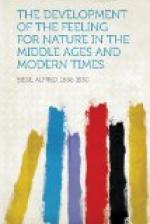Then the Spring greetings:
Now we go into the wide, wide world,
With joy and delight we go;
The woods are dressing, the meadows greening,
The flowers beginning to blow.
Listen here! and look there! We can
scarce trust our eyes,
For the singing and soaring, the joy and
life everywhere.
And:
What is sweeter than to wander in the
early days of Spring
From one place to another in sheer delight
and glee;
While the sun is shining brightly, and
the birds exult around
Fair Nightingale, the foremost of them
all?
This has the pulse of true and naive feeling (the hunter is starting for the hunt in the early morning):
When I come into the forest, still and
silent everywhere,
There’s a look of slumber in it,
but the air is fresh and cool.
Now Aurora paints the fir tops at their
very tips with gold,
And the little finch sits up there launching
forth his song of praise,
Thanking for the night that’s over,
for the day that’s just awake
Gently blows the breeze of morning, rocking
in the topmost twigs,
And it bends them down like children,
like good children when they pray;
And the dew is an oblation as it drops
from their green hair.
O what beauties in the forest he that
we may see and know!
One could melt away one’s heart
before its wonders manifold!
The sixth line in the original has a melody that reminds one of Goethe’s early work.
But even amidst the artificial poetry then in vogue, there were a few side streams which turned away from the main current of the great poet schools, from the unnaturalness and bombast affected especially by the Silesians. As Winter says, even the satirists Moscherosch and Logau were indirectly of use in paving the way for a healthier condition, through their severe criticisms of the corruption of the language; and Logau’s one epigram on May, ’This month is a kiss which heaven gives to earth, that she may be a bride now, a mother by-and-by,’ outweighs all Harsdoerfer’s and Zesen’s poetry about Nature.
But even by the side of Opitz and Fleming there was at least one poet of real feeling, Friedrich von Spee.[2] With all his mystic and pietist Christianity, he kept an open eye for Nature. His poems are full of disdain of the world and joy in Nature,[3] longings for death and lamentations over sin; he delighted in personifications of abstract ideas, childish playing with words and feelings, and sentimental enthusiasm. But mawkish and canting as he was apt to be, he often shewed a fine appreciation of detail. He was even—a rare thing then—fascinated by the sea.
Now rages and roars the wild, wild sea,
Now in soft curves lies quietly;
Sweetly the light of the sun’s bright
glow
Mirrors itself in the water below.
Sad winter’s past—the
stork is here,
Birds are singing and nests appear;
Bowery homes steal into the day,
Flow’rets present their full array;
Like little snakes and woods about,
The streams go wandering in and out.




